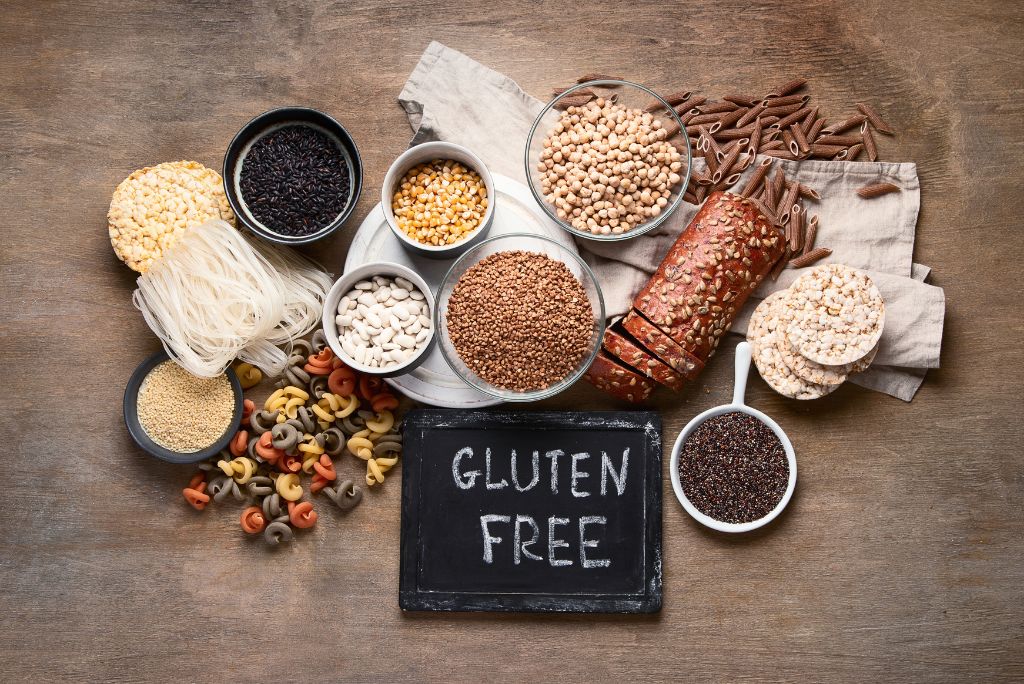Gluten-free diets are growing in popularity. Many people choose gluten-free products as part of an effort to be healthier, similar to choosing organic meat, fruit, and vegetables. They are commonly treated as a health-conscious option.
Most people are not allergic to gluten and few are intolerant to it, so why the craze about gluten-free? This article will help debunk the myths around gluten-free, so you can eat what you like without unnecessary restrictions.
At the same time, we understand that gluten sensitivity is a real issue for some people, but don’t worry, Halal Origins has you covered with our range of delicious gluten-free burgers and gluten-free sausages.
What is Gluten?
Gluten is a protein found in wheat, barley, and rye. It gives dough its elasticity and helps baked goods rise.
For those with coeliac disease, a serious autoimmune disorder, gluten triggers an immune response that damages the small intestine.
Coeliac disease is uncommon and requires professional diagnosis and treatment. More common is gluten sensitivity, however, this is commonly self-diagnosed and misdiagnosed.
coeliac Disease vs. Non-coeliac Gluten Sensitivity (NCGS)
While coeliac disease is a well-defined condition, non-coeliac gluten sensitivity (NCGS) is a more elusive concept. People with NCGS experience symptoms like bloating, gas, diarrhoea, constipation, fatigue, and headaches after consuming gluten, but they don't have coeliac disease.
Those who diagnose themselves as being sensitive to gluten may well have broader gut health issues owing to a historically poor diet or have irritable bowel syndrome, which has overlapping symptoms.
Unless you are formally diagnosed or go through an elimination diet, it is difficult todetermine which ingredients your body adversely reacts to. Many who complain of gluten sensitivity are likely eating foods that contain or are accompanied by other ingredients that they react to.
Outside of formal testing and diagnosis, the only way to be certain is to isolate food groups until you discover which ingredients are the culprits.
FODMAP Diet
FODMAP stands for fermentable oligosaccharides, disaccharides, monosaccharides and polyols, which are types of carbohydrates that can be poorly absorbed in the small intestine and fermented by bacteria in the large intestine, leading to digestive discomfort.
Common foods that rank high on the FODMAP score include:
- Wheat: Bread, pasta, pastries, cereals
- Dairy: Milk, yoghurt, ice cream
- Legumes: Beans, lentils, chickpeas
- Fruits: Apples, pears, cherries, mangoes
- Vegetables: Garlic, onion, artichoke, asparagus
- Sweeteners: Honey, agave nectar, sugar alcohols (sorbitol, mannitol, xylitol)
As you can see from the list above, wheat, bread, pasta and pastries are FODMAP culprits, but they are also products that typically contain gluten. The other ingredients are typically found in products containing gluten or accompany them. The list above is not exhaustive. Many food items contain FODMAP - essentially, any carbohydrate.
The FODMAP diet is a specialised eating plan designed to manage irritable bowel syndrome (IBS) symptoms like bloating, gas, and abdominal pain.
How the FODMAP Diet Works
Elimination phase - You start by eliminating high-FODMAP foods from your diet for a few weeks. This helps identify which foods trigger your symptoms.
Reintroduction phase - You gradually reintroduce high-FODMAP foods one at a time, monitoring your symptoms to identify your triggers. It helps to keep a journal of everything you eat and how your body responds to it.
You can include gluten-free products like Halal Origin’s delicious gluten-free burgers and gluten-free sausages and their gluten-containing alternatives at this stage to determine whether you react negatively to them.
Personalization phase - Once you've identified your triggers, you can create a personalised eating plan that minimises your symptoms while maximising your dietary intake. Remember, that tolerance to all foods, including both FODMAPs and gluten changes depending on how much you are exposed to it. This is not true for those with coeliac disease, however.
The truth behind the popular gluten-free diet
Gluten-free diets have become part of popular culture much like veganism, eating organic, and the carnivore or keto diets. While there is merit in giving your body a brief break from certain food types, it is wholly unnecessary and often inappropriate to permanently eliminate food groups. As always, balance is crucial.
The unfortunate truth about the popularity of the gluten-free diet is that it often stems from celebrity endorsement, manipulative marketing tactics from food companies, and misdiagnosis from individuals with wider sensitivities.
Final thoughts
If you do not have coeliac disease, then you probably don’t need to abandon gluten products indefinitely, although it might help to manage your exposure. The point of this article isn’t to discourage you from choosing gluten-free options, but rather to prevent you from being unnecessarily restrictive.
As always, moderation goes a long way to ensuring that you have a balanced diet. For those who have coeliac disease or insist on eating only gluten-free, don’t worry because Halal Origins has your back with the finest organic, gluten-free burgers and organic, gluten-free sausages, all halal to support your Islamic faith.
Our gluten-free range is forever expanding and includes your favourite organic meats and flavours. We now have gluten-free spicy beef sausages, gluten-free beef meatballs, and gluten-free Cumberland chicken sausages. And, if you really want to treat yourself, try our delicious gluten-free herby lamb sausages -Yum!.
Whatever flavours take your fancy, Halal Origins has a delicious option waiting for you, so you never have to miss out ever again. Check out our gluten-free recipes that are coming soon.

